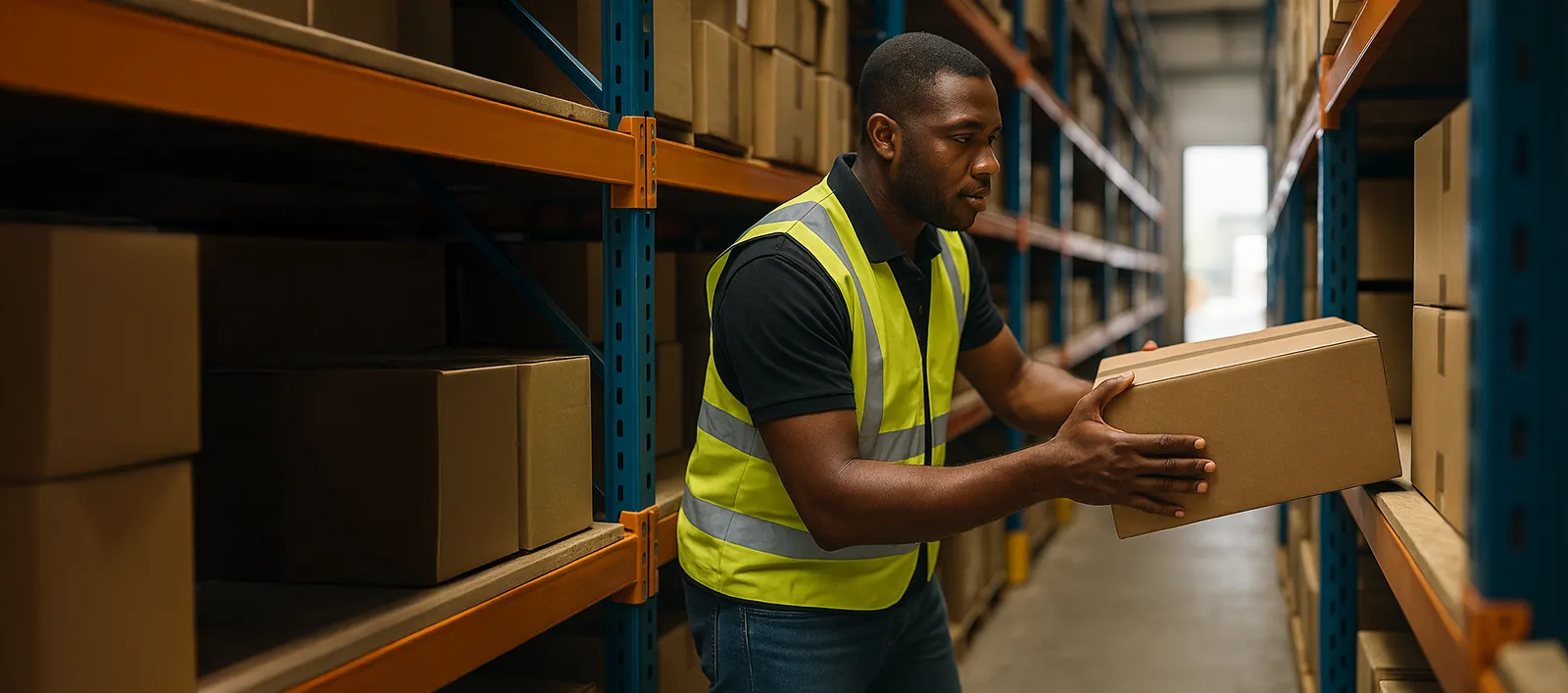Interviewing is a vital step in the hiring process for both warehouse worker candidates and warehousing/manufacturing employers.
For the candidate, the interview is an opportunity to showcase their skills, experience, and suitability for the role. It allows them to demonstrate their understanding of the job requirements, their ability to perform under pressure, and their commitment to safety and efficiency. The interview also gives the candidate a chance to ask questions about the company, the work environment, and the expectations of the role, helping them to decide if the job is a good fit for them.
For the employer, the interview is a valuable tool for assessing the candidate's abilities, attitude, and potential fit within the team. It allows the employer to gauge the candidate's understanding of warehouse operations, their problem-solving skills, their reliability, and their ability to handle the physical demands of the job.
The importance of safety when hiring warehouse workers
Hiring the right warehouse workers is crucial for maintaining a safe and efficient work environment. Warehouses can be hazardous places, with risks ranging from heavy machinery operation to manual lifting, slips and falls, and even exposure to harmful substances.
It's essential that during interviews, the employer looks for warehouse workers who are aware of these risks and know how to mitigate them. The right warehouse workers will have a strong understanding of the following:
- Safety protocols and procedures: Warehouse workers will know how to operate machinery safely, how to lift heavy items without risking injury, and how to handle hazardous materials appropriately. They will also be aware of the importance of wearing protective gear and following safety guidelines at all times.
- Being proactive about safety: Warehouse workers will not only follow safety procedures themselves, but they will also be vigilant about identifying potential hazards and taking action to prevent accidents. This could involve anything from cleaning up spills promptly to reporting faulty machinery or unsafe practices.
- Contributing to a culture of safety within the warehouse: Warehouse workers will set a positive example for their colleagues, encourage others to follow safety procedures, and contribute to ongoing safety training and education. They will understand that safety is a collective responsibility and that everyone has a role to play in maintaining a safe work environment.
Warehousing and manufacturing facilities should remember that hiring the right warehouse workers is not just about filling vacancies—it's about ensuring the safety and well-being of all staff, maintaining a positive and productive work environment, and ultimately, ensuring the success and reputation of the business.
10 questions to ask in an interview for a warehouse worker position
In order to get an accurate assessment of a candidate's skill and strengths, here are the top 10 questions to ask:
- Can you describe your experience with warehouse work?
- Are you certified or trained in operating warehouse machinery like forklifts?
- How do you ensure safety and cleanliness in a warehouse environment?
- Can you describe a time when you had to work under a tight deadline?
- How do you handle heavy lifting and physically demanding tasks?
- Can you describe a situation where you identified a problem in the warehouse and how you resolved it?
- How do you manage your time and prioritize tasks in a busy warehouse setting?
- Are you comfortable working in a team and coordinating with other departments?
- How do you handle inventory management and keeping track of stock?
- Can you work flexible hours, including nights, weekends, and holidays if required?
1. Can you describe your experience with warehouse work?
An employer should be looking for several key elements in the candidate's answer:
- Familiarity with warehouse operations: The candidate should demonstrate a clear understanding of how a warehouse operates. This includes knowledge of inventory management, shipping and receiving procedures, and the use of warehouse equipment.
- Specific skills: The candidate should mention specific skills they've acquired that are relevant to warehouse work. This could include operating forklifts, using warehouse management software, or packing and sorting goods.
- Safety practices: Safety is crucial in a warehouse setting. The candidate should mention their familiarity with safety protocols, such as proper lifting techniques and the use of personal protective equipment.
- Problem-solving: Warehouses often face challenges such as space constraints, time pressures, or logistical issues. The candidate should provide examples of problems they've encountered in a warehouse setting and how they've solved them.
- Teamwork: Warehouses typically require a high level of coordination and cooperation among staff. The candidate should demonstrate their ability to work effectively as part of a team.
- Work ethic: The candidate should convey a strong work ethic, including reliability, punctuality, and a willingness to take on physically demanding tasks.
- Growth and learning: Ideally, the candidate should show that they've taken on increasing responsibilities over time or have sought to improve their skills through training or learning opportunities. This shows a commitment to their career and a potential for growth within your company.
2. Are you certified or trained in operating warehouse machinery like forklifts?
An employer should be looking for several key elements in the candidate's answer:
- Specific certifications: The candidate should be able to provide details about any specific certifications they hold, such as a forklift operator's license. They should be able to tell you when and where they received the certification, and possibly the grade they achieved if applicable.
- Training experience: If the candidate does not hold a specific certification, they may still have received on-the-job training in operating warehouse machinery. They should be able to describe this training in detail, including who provided it, what it involved, and how long it lasted.
- Safety knowledge: Whether they are certified or not, the candidate should demonstrate a strong understanding of safety procedures related to operating warehouse machinery. This could include pre-operation inspections, load handling, and what to do in case of an emergency.
- Practical experience: Ideally, the candidate will also have practical experience operating warehouse machinery in a real-world setting. They should be able to describe this experience, including the types of machinery they have operated and the tasks they have performed.
- Willingness to learn: If the candidate does not have certification or training, they should express a willingness to undergo training and learn how to operate warehouse machinery safely and efficiently. This shows initiative and a commitment to performing the job to the best of their ability.
3. How do you ensure safety and cleanliness in a warehouse environment?
An employer should be looking for several key elements in the candidate's answer:
- Knowledge of safety protocols: The candidate should demonstrate a clear understanding of safety protocols in a warehouse setting. This includes proper handling and storage of goods, correct use of equipment, and adherence to safety guidelines such as wearing protective gear.
- Proactive measures: The candidate should describe proactive measures they take to maintain safety and cleanliness. This could include regular inspections of their work area, immediate cleanup of spills or debris, and proper disposal of waste.
- Training and compliance: The candidate should mention any safety training they've received and their commitment to following all safety regulations. They should also be aware of the consequences of non-compliance.
- Teamwork and communication: Safety in a warehouse is a collective responsibility. The candidate should demonstrate their ability to work as part of a team to maintain a safe environment, and their willingness to communicate any safety concerns to their supervisors or colleagues.
- Problem-solving: The candidate should be able to provide examples of safety or cleanliness issues they've encountered in a warehouse setting and how they've resolved them. This shows their ability to think on their feet and take action to prevent accidents or health hazards.
- Continuous improvement: Ideally, the candidate will also show a commitment to continuous improvement in safety and cleanliness. This could involve staying updated on the latest safety guidelines, suggesting improvements to current practices, or participating in safety drills and training sessions.
4. Can you describe a time when you had to work under a tight deadline?
An employer should be looking for several key elements in the candidate's answer:
- Situation and task: The candidate should clearly describe a specific situation where they faced a tight deadline. This includes the task they were assigned and why the deadline was tight.
- Action: The candidate should explain the steps they took to meet the deadline. This could involve prioritizing tasks, delegating responsibilities, using time management skills, or finding efficient ways to complete the work.
- Problem-solving skills: The candidate should demonstrate their ability to think quickly and make effective decisions under pressure. They should show that they can identify potential issues and find solutions to keep the work on track.
- Teamwork: If the task involved other people, the candidate should describe how they collaborated with others to meet the deadline. This could involve clear communication, coordination, and conflict resolution.
- Result: The candidate should explain the outcome of the situation. Ideally, they were able to meet the deadline without compromising the quality of their work. If they were not able to meet the deadline, they should explain why and what they learned from the experience.
- Reflection: The candidate should reflect on the experience and discuss any lessons learned or skills gained. This shows that they are capable of learning from their experiences and applying these lessons to future challenges.
5. How do you handle heavy lifting and physically demanding tasks?
An employer should be looking for several key elements in the candidate's answer:
- Physical fitness: The candidate should confirm that they are physically capable of performing heavy lifting and other demanding tasks. In addition, the candidate should provide examples of their ability to perform physically demanding tasks over extended periods. This could involve long shifts, repetitive tasks, or working in challenging conditions.
- Safety awareness: The candidate should demonstrate a clear understanding of safety procedures related to heavy lifting. This includes knowledge of proper lifting techniques to avoid injury, such as bending at the knees and keeping the back straight.
- Use of equipment: If applicable, the candidate should mention their experience or willingness to use equipment designed to assist with heavy lifting, such as forklifts or pallet jacks.
- Self-care: The candidate should show an understanding of the importance of rest and recovery when doing physically demanding work. This could include taking regular breaks, staying hydrated, and ensuring they get enough sleep.
6. Can you describe a situation where you identified a problem in the warehouse and how you resolved it?
An employer should be looking for several key elements in the candidate's answer:
- Observation skills: The candidate should demonstrate their ability to notice and identify issues in the warehouse. This could be related to safety hazards, inefficiencies, or errors in inventory.
- Analytical thinking: The candidate should show their ability to analyze the problem and understand its cause. This could involve identifying patterns, investigating underlying issues, or consulting with others to gain more information.
- Problem-solving skills: The candidate should explain the steps they took to resolve the problem. This could involve developing a plan, implementing a solution, or coordinating with others to address the issue.
- Initiative: The candidate should demonstrate that they took the initiative to address the problem rather than ignoring it or leaving it for someone else to deal with. This shows a sense of responsibility and a proactive approach to their work.
- Communication: If the problem involved other people or departments, the candidate should describe how they communicated the issue and worked with others to resolve it. This could involve reporting the problem to a supervisor, discussing it with a team, or providing feedback to colleagues.
- Outcome and learning: The candidate should explain the outcome of the situation and what they learned from it. This shows that they are capable of learning from their experiences and applying these lessons to future challenges.
7. How do you manage your time and prioritize tasks in a busy warehouse setting?
An employer should be looking for several key elements in the candidate's answer:
- Organization skills: The candidate should demonstrate their ability to organize tasks effectively. This could involve making to-do lists, scheduling tasks, or using project management tools.
- Prioritization techniques: The candidate should explain how they decide which tasks to prioritize. This could involve assessing the urgency and importance of each task, considering deadlines, or balancing the needs of different departments or team members.
- Efficiency: The candidate should show that they can work efficiently in a busy environment. This could involve finding ways to streamline tasks, reduce waste, or improve workflows.
- Flexibility: The candidate should demonstrate their ability to adapt to changing priorities or unexpected challenges. This could involve adjusting their schedule, reallocating resources, or finding creative solutions to problems.
- Teamwork: If the role involves working as part of a team, the candidate should explain how they coordinate with others to manage tasks and deadlines. This could involve clear communication, delegation, or collaborative planning.
- Stress management: The candidate should show that they can manage stress and maintain productivity in a busy environment. This could involve taking regular breaks, practicing mindfulness, or maintaining a positive attitude.
8. Are you comfortable working in a team and coordinating with other departments?
An employer should be looking for several key elements in the candidate's answer:
- Teamwork skills: The candidate should demonstrate their ability to work effectively as part of a team. This could involve sharing tasks, supporting colleagues, resolving conflicts, or contributing to a positive team culture.
- Communication skills: The candidate should show that they can communicate clearly and effectively with team members and colleagues from other departments. This could involve explaining tasks, providing updates, giving and receiving feedback, or discussing problems and solutions.
- Coordination and collaboration: The candidate should demonstrate their ability to coordinate tasks and collaborate on projects with colleagues from other departments. This could involve planning and scheduling tasks, sharing resources, or working together to achieve common goals.
- Respect for diversity: The candidate should show that they can work effectively with people from diverse backgrounds and with different roles, skills, and perspectives. This could involve showing respect for others' ideas and contributions, adapting to different working styles, or learning from others' expertise.
- Problem-solving: The candidate should demonstrate their ability to solve problems that arise in a team or cross-departmental context. This could involve mediating conflicts, finding compromises, or developing creative solutions to challenges.
- Examples from past experience: Ideally, the candidate will provide specific examples from their past experience that demonstrate their teamwork and coordination skills. This could involve successful team projects, positive feedback from colleagues, or improvements they've contributed to in team or cross-departmental processes.
9. How do you handle inventory management and keeping track of stock?
An employer should be looking for several key elements in the candidate's answer:
- Familiarity with inventory systems: The candidate should demonstrate their experience with or understanding of inventory management systems. This could be manual systems, like spreadsheets, or digital systems, like warehouse management software.
- Accuracy and attention to detail: The candidate should emphasize their commitment to accuracy in inventory management. They should understand the importance of precise record-keeping and the potential consequences of errors.
- Organization skills: The candidate should show their ability to keep track of multiple items, possibly in different locations or in various stages of the supply chain. They should be able to describe methods they use to stay organized.
- Regular auditing: The candidate should mention the importance of regular stock checks or audits to ensure the physical stock matches the recorded inventory. They should be able to describe their experience with or approach to these audits.
- Problem-solving: The candidate should demonstrate their ability to identify and resolve discrepancies or issues in inventory management. This could involve finding lost items, correcting recording errors, or addressing issues with suppliers or customers.
- Continuous improvement: Ideally, the candidate will also show a commitment to improving inventory management processes. This could involve staying updated on the latest tools and techniques, suggesting improvements to current practices, or learning from past mistakes.
10. Can you work flexible hours, including nights, weekends, and holidays if required?
Remember, it's essential to respect labor laws and regulations regarding working hours and overtime, and to ensure that any expectations of working outside of regular hours are clearly communicated and agreed upon.
An employer should be looking for several key elements in the candidate's answer:
- Availability: The candidate should clearly state their availability. If they can work flexible hours, including nights, weekends, and holidays, they should confirm this.
- Understanding of requirements: The candidate should demonstrate an understanding that warehouse operations often require flexibility and that shifts can vary based on the needs of the business.
- Previous experience: If the candidate has previous experience working non-traditional hours or shifts, they should mention this. It shows they are already accustomed to such a schedule.
- Commitment: The candidate's willingness to work flexible hours can indicate their commitment to the job and their understanding of the role's demands.
- Work-life balance: While it's important for the candidate to be flexible, they should also show that they understand the importance of maintaining a healthy work-life balance. This could involve mentioning how they manage their time or cope with irregular hours.
Conclusion
Hiring the right warehouse worker is crucial for any warehouse or manufacturing facility as it directly impacts safety, efficiency, and productivity. The right candidate not only possesses the necessary skills and experience but also demonstrates a strong work ethic, problem-solving abilities, and a commitment to safety.
Therefore, a thorough interview process is essential to assess these qualities and ensure the candidate is a good fit for the role and the company culture.















